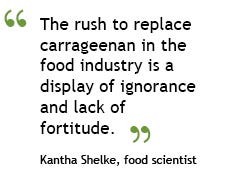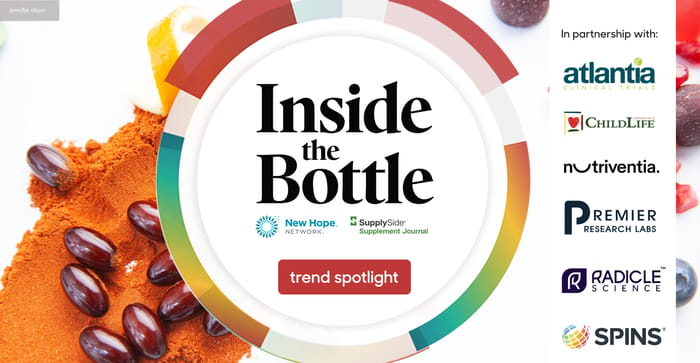December 19, 2014

What is carrageenan?
Red seaweed extract. Homemade versions using Chondrus crispus, a.k.a. “Irish moss” were used for centuries across Ireland for respiratory problems.
Today, two distinct varieties of carrageenan exist in U.S. manufacturing: Food-grade, or “undegraded,” is extracted with heat, water, and mild acids and alkali. “Degraded” carrageenan, a.k.a. “poligeenan,” is extracted by boiling it in much stronger acid “like battery acid” for long periods to reduce it to a small molecule, says William Matakas, seaweed platform marketing manager for ingredient supplier FMC. Poligeenan is used in medical imaging (to make shakes consumed prior to an MRI) and in animal studies to induce inflammation. Some health agencies characterize it as a potential carcinogen. “It is a completely different compound, and it is never used in food,” Matakas stresses.
What’s carrageenan used for?
Matakas estimates the food-grade carrageenan business to be worth roughly $1 billion globally. According to the Seaweed Industry Association, U.S. consumers ingest 30-50 mg per day. It’s used as a thickener to make low-fat yogurts, ice creams, dressings and sauces retain creaminess, a preservative to make products like protein beverages, jams, snack bars and infant formulas shelf stable, and a vegan alternative to gelatin.
Carrageenan concerns
In April 2012, University of Illinois researcher Joanne Tobacman, MD, petitioned the National Organic Standards Board to ban carrageenan from organics because of mounting research suggesting it prompts an inflammatory immune response similar to that of salmonella. In 2013, the nonprofit Cornucopia Institute petitioned FDA to remove carrageenan from the food supply. Both petitions were denied.
What the science says about carrageenan
Dueling studies have arrived at different conclusions. In 2014, the World Health Organization completed a review of the science (much of it industry funded), concluding that food-grade carrageenan is safe for use in infant formula. But numerous publicly funde d animal and in-vitro studies suggest certain forms impair insulin function, could lead to gastrointestinal disease and increase diabetes risk. The National Institutes of Health is now funding a human trial looking at whether a carrageenan-free diet can improve colitis symptoms.
d animal and in-vitro studies suggest certain forms impair insulin function, could lead to gastrointestinal disease and increase diabetes risk. The National Institutes of Health is now funding a human trial looking at whether a carrageenan-free diet can improve colitis symptoms.
Food scientist Kantha Shelke, PhD, believes the current “hysteria” over carrageenan is largely a matter of mistaken identity. She and others note that many oft-cited studies used degraded carrageenan (poligeenan) in lab animals not people. “There is no epidemiological evidence for a carcinogenic, tumor promoting or inflammatory effect of (food-grade) carrageenan in humans,” Shelke says. Some research does suggest, however, that food-grade carrageenan can be contaminated with its more lethal cousin during the production process, and that it can become “degraded” by stomach acid. Matakas says no way. “Your body is about the pH of orange juice, not battery acid, and it isn’t boiling.”
How industry is responding
Organic Valley recently vowed to rid its heavy whipping cream and aseptic chocolate milk of carrageenan. Companies are testing agar and gum Arabica as potential substitutes. Shelke says such moves could come at a cost, jeopardizing the safety and palatability of the finished product. (When Starbucks removed it from its milk alternatives, customers complained that it looked spoiled and didn’t make their coffee creamy enough.) “The rush to replace carrageenan in the food industry is a display of ignorance and lack of fortitude,” says Shelke.
Meanwhile, the Cornucopia Institute has developed a shopping guide for avoiding carrageenan and intends to keep on the FDA to—if nothing else—get it out of organics. “Even if I gave the industry the benefit of the doubt and said that the research is mixed, I would still say it should not be in organic food,” says Director Mark Kastel. “We should operate under the precautionary principle and preclude things unless there is a high degree of comfort that they are safe. We don’t have that.”

Is it OK for carrageenan-containing products to carry a natural label? Why? Or why not?
About the Author
You May Also Like
.png?width=700&auto=webp&quality=80&disable=upscale)



